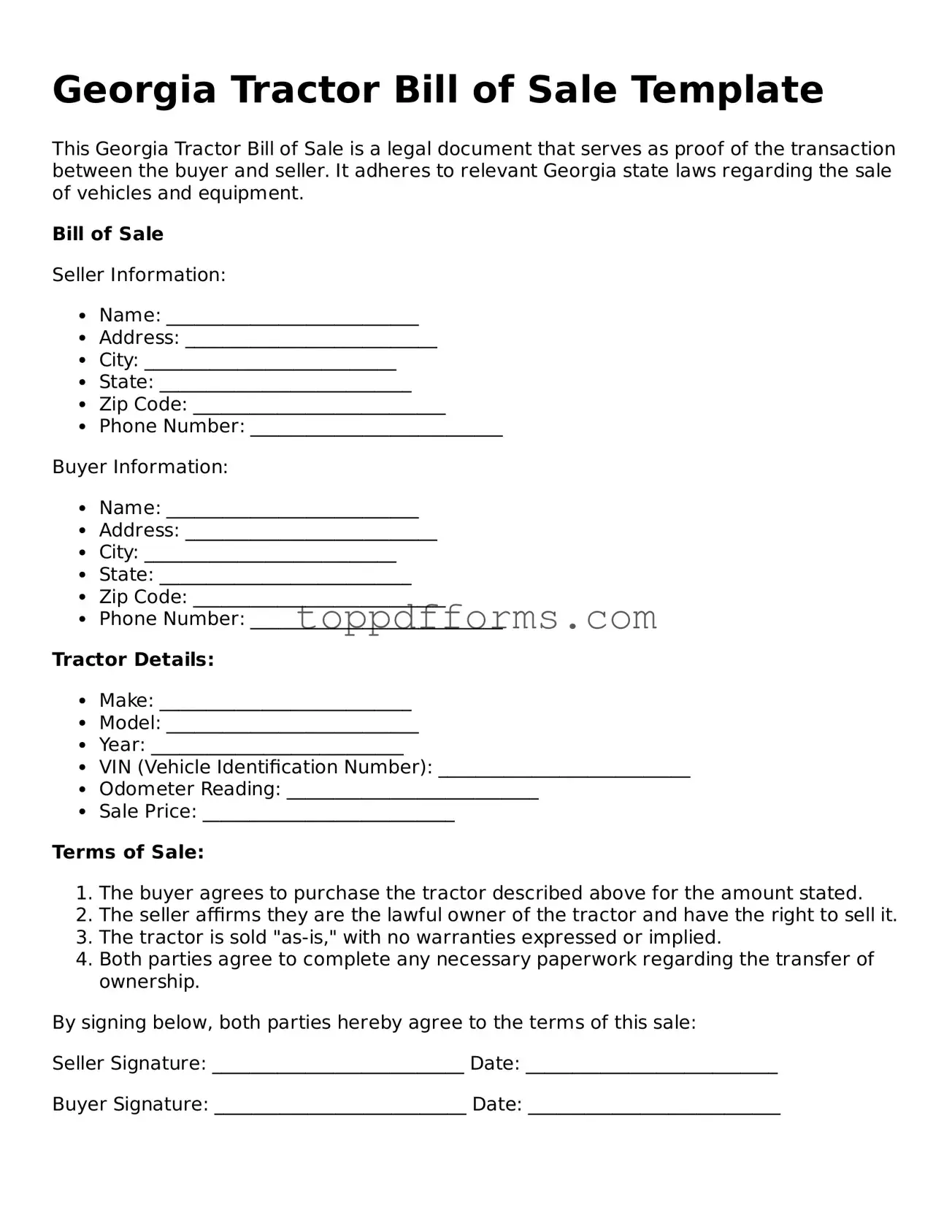Tractor Bill of Sale Document for Georgia State
Things You Should Know About This Form
What is a Georgia Tractor Bill of Sale form?
A Georgia Tractor Bill of Sale form is a legal document that records the sale of a tractor between a buyer and a seller. This form serves as proof of the transaction, detailing important information such as the names of the parties involved, the purchase price, and a description of the tractor being sold. Having this document can protect both the buyer and seller by providing clear evidence of the sale, which can be useful for registration, taxation, or any future disputes.
Why do I need a Bill of Sale for a tractor in Georgia?
In Georgia, a Bill of Sale is not just a good idea; it’s often necessary. This document helps to establish ownership and can be required for registering the tractor with the state. It also serves as a record of the transaction, which can be beneficial if there are any issues later on, such as disputes over ownership or condition. Additionally, having a Bill of Sale can help you avoid potential legal problems by clearly outlining the terms of the sale.
What information should be included in a Georgia Tractor Bill of Sale?
A comprehensive Georgia Tractor Bill of Sale should include several key pieces of information. First, it should list the names and addresses of both the buyer and the seller. Next, a detailed description of the tractor is essential; this includes the make, model, year, and Vehicle Identification Number (VIN) if applicable. The purchase price must also be clearly stated, along with the date of the sale. Finally, both parties should sign the document to make it legally binding.
Is a notary required for a Georgia Tractor Bill of Sale?
In Georgia, a notary is not typically required for a Tractor Bill of Sale. However, having the document notarized can add an extra layer of security and authenticity to the transaction. It can help verify the identities of the parties involved and confirm that they willingly entered into the agreement. While notarization is not mandatory, it is often recommended, especially for higher-value transactions, to ensure that both parties feel secure in their agreement.
PDF Overview
| Fact Name | Details |
|---|---|
| Purpose | The Georgia Tractor Bill of Sale form is used to document the sale and transfer of ownership of a tractor in Georgia. |
| Requirements | The form must include details such as the buyer's and seller's names, addresses, and the tractor's identification information. |
| Governing Law | The sale and transfer of tractors in Georgia are governed by the Official Code of Georgia Annotated (O.C.G.A.) § 10-1-200 et seq. |
| Signatures | Both the buyer and seller must sign the form to validate the transaction. |
| Record Keeping | It is advisable for both parties to keep a copy of the completed Bill of Sale for their records. |
Common mistakes
Filling out the Georgia Tractor Bill of Sale form is a crucial step in the process of buying or selling a tractor. However, many individuals make common mistakes that can lead to confusion or legal issues down the line. Understanding these pitfalls can save time and ensure a smooth transaction.
One frequent mistake is failing to include accurate vehicle identification information. This includes the make, model, year, and serial number of the tractor. Inaccuracies can create problems for both the buyer and seller, as it may lead to disputes over ownership or the condition of the tractor. Always double-check this information before submitting the form.
Another common error involves neglecting to provide the correct date of sale. The date is essential for establishing when the transaction took place, which can affect warranties, registrations, and even tax obligations. A simple oversight can lead to complications, especially if the buyer or seller needs to reference the sale in the future.
Additionally, people often forget to include the purchase price. This detail is not merely a formality; it plays a significant role in determining taxes owed on the transaction. Omitting the purchase price can raise red flags with tax authorities, leading to potential fines or audits. Always ensure that this information is clearly stated on the form.
Another mistake is not obtaining the necessary signatures. Both the buyer and seller must sign the bill of sale for it to be valid. A missing signature can render the document ineffective, causing complications if either party needs to prove the transaction later. It’s wise to confirm that all required signatures are present before finalizing the sale.
Lastly, individuals sometimes overlook the importance of keeping a copy of the completed form. After the sale, both parties should retain a copy for their records. This serves as proof of the transaction and can be invaluable if any disputes arise in the future. A simple step, yet often neglected, can provide peace of mind and legal protection.
Other Common State-specific Tractor Bill of Sale Forms
Farm Equipment Bill of Sale - Defines terms of the sale, including price and condition.
To ensure a smooth transaction when transferring ownership of a trailer, it is crucial to complete a Trailer Bill of Sale form correctly. This document not only formalizes the sale but also protects both parties by clearly stating the terms of the agreement. For those seeking assistance with the creation of this essential form, you can find helpful resources by visiting PDF Templates.
Farm Equipment Bill of Sale - A document for transferring ownership of a tractor.
